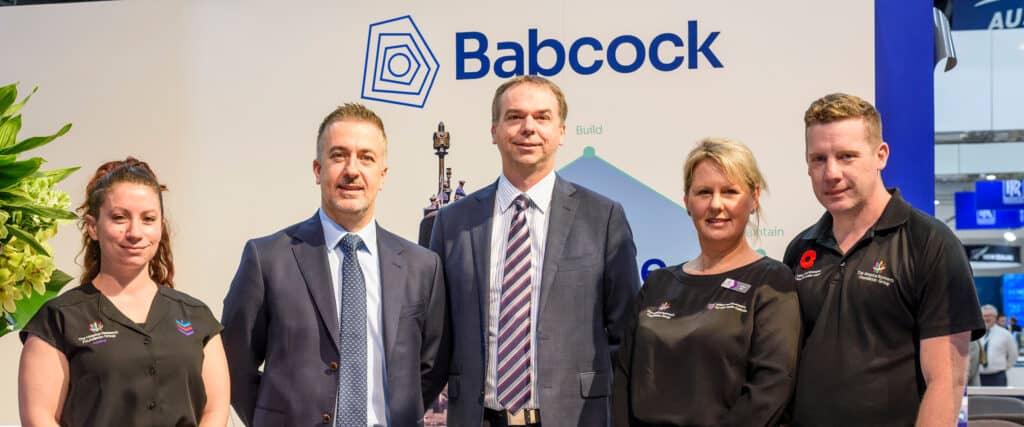
Babcock Australasia (Babcock) is extending its decade-long partnership with Military and Emergency Services Health Australia (MESHA), enabling the defence and emergency services not-for-profit to expand into Western Australia to support local service personnel and their families.
Babcock has proudly supported MESHA, part of The Hospital Research Foundation (THRF) Group, for 10 years and this year, has extended its support signing on as a Corporate Partner under a new two-year agreement.
The partnership broadens MESHA’s reach into WA, including establishing a locally based lived experience workforce for the first time. This expansion will play a central role in delivering MESHA’s programs, research and resources to support service personnel and their families located in the West. MESHA will deliver a suite of pilot programs to service personnel in Western Australia including:
- The Group Emotional and Relationship Skills (GEARS) program – a 12-week psychoeducation and skills-based course specifically designed for current and former emergency service personnel and military members.
- The MindRight and StoryRight programs – programs which set participants up for success in their post-service career and understanding their personal identity, with pride and dignity.
- The Psychosocial Safety Program – an intensive prevention program for new recruits or high-risk units intended to train members in the skills required to manage mental distress, informed by their specific context of service.
Last week, at the Indo Pacific International Maritime Exposition in Sydney, Babcock proudly hosted MESHA on its stand, giving guests the chance to meet the MESHA team, connect with fellow veterans and first responders and find out more about their work.
MESHA Program Officer – Logistics and Administration Kathleen Pisani – is someone who has benefited from the group’s critical work following an 18-year career in the Australian Army, which included overseas service with the United Nations and assignments in Malaysia, Thailand and South Sudan.
Ms Pisani said both MESHA’s MindRight and StoryRight programs gave her essential skills to help her find a job after her time in the Army.
“I thought I was prepared for this loss of identity for my own transition, because I had researched and planned ahead. In the end, I was wrong. I was ultimately unprepared for how much I would struggle with my transition and MESHA’s programs made a huge difference during that period,” she said.
“MindRight and StoryRight provided me with the skills that I was missing and it provided them in a psychologically safe place which was very important to me. The programs were delivered at a table surrounded by other service-people who were going through the same thing and was facilitated by ex-service people. There was such safety, support and validation in that environment.”
Babcock Australasia CEO Andrew Cridland said:
“Our service men and women play a critical role in keeping our country safe and we are pleased to extend our long-running partnership with MESHA to give back to those who have sacrificed so much for our community.
“Babcock has proudly contributed to Australian national security endeavours from Western Australia since 2001 and we sustain nearly 1,000 jobs statewide, most notably as Regional Maintenance Provider–West.
“Babcock has established enduring partnerships with organisations like MESHA that are focused on working collaboratively to create beneficial outcomes for the communities that support the work that we do, including in Western Australia.”
Head of The Hospital Research Foundation Group – MESHA Dr Karen May said:
“We are proud to be partnering with Babcock to expand MESHA’s vital services into Western Australia. This collaboration marks a significant step forward in meeting the growing needs of current and former military and emergency service personnel and their families across the state.
“By building a strong, lived experience workforce in WA, we’re ensuring our support is meaningful and accessible to those who need it most.”
